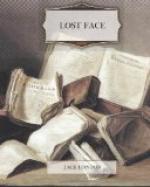He pictured the boys finding his body next day. Suddenly he found himself with them, coming along the trail and looking for himself. And, still with them, he came around a turn in the trail and found himself lying in the snow. He did not belong with himself any more, for even then he was out of himself, standing with the boys and looking at himself in the snow. It certainly was cold, was his thought. When he got back to the States he could tell the folks what real cold was. He drifted on from this to a vision of the old-timer on Sulphur Creek. He could see him quite clearly, warm and comfortable, and smoking a pipe.
“You were right, old hoss; you were right,” the man mumbled to the old-timer of Sulphur Creek.
Then the man drowsed off into what seemed to him the most comfortable and satisfying sleep he had ever known. The dog sat facing him and waiting. The brief day drew to a close in a long, slow twilight. There were no signs of a fire to be made, and, besides, never in the dog’s experience had it known a man to sit like that in the snow and make no fire. As the twilight drew on, its eager yearning for the fire mastered it, and with a great lifting and shifting of forefeet, it whined softly, then flattened its ears down in anticipation of being chidden by the man. But the man remained silent. Later, the dog whined loudly. And still later it crept close to the man and caught the scent of death. This made the animal bristle and back away. A little longer it delayed, howling under the stars that leaped and danced and shone brightly in the cold sky. Then it turned and trotted up the trail in the direction of the camp it knew, where were the other food-providers and fire-providers.
THAT SPOT
I don’t think much of Stephen Mackaye any more, though I used to swear by him. I know that in those days I loved him more than my own brother. If ever I meet Stephen Mackaye again, I shall not be responsible for my actions. It passes beyond me that a man with whom I shared food and blanket, and with whom I mushed over the Chilcoot Trail, should turn out the way he did. I always sized Steve up as a square man, a kindly comrade, without an iota of anything vindictive or malicious in his nature. I shall never trust my judgment in men again. Why, I nursed that man through typhoid fever; we starved together on the headwaters of the Stewart; and he saved my life on the Little Salmon. And now, after the years we were together, all I can say of Stephen Mackaye is that he is the meanest man I ever knew.




